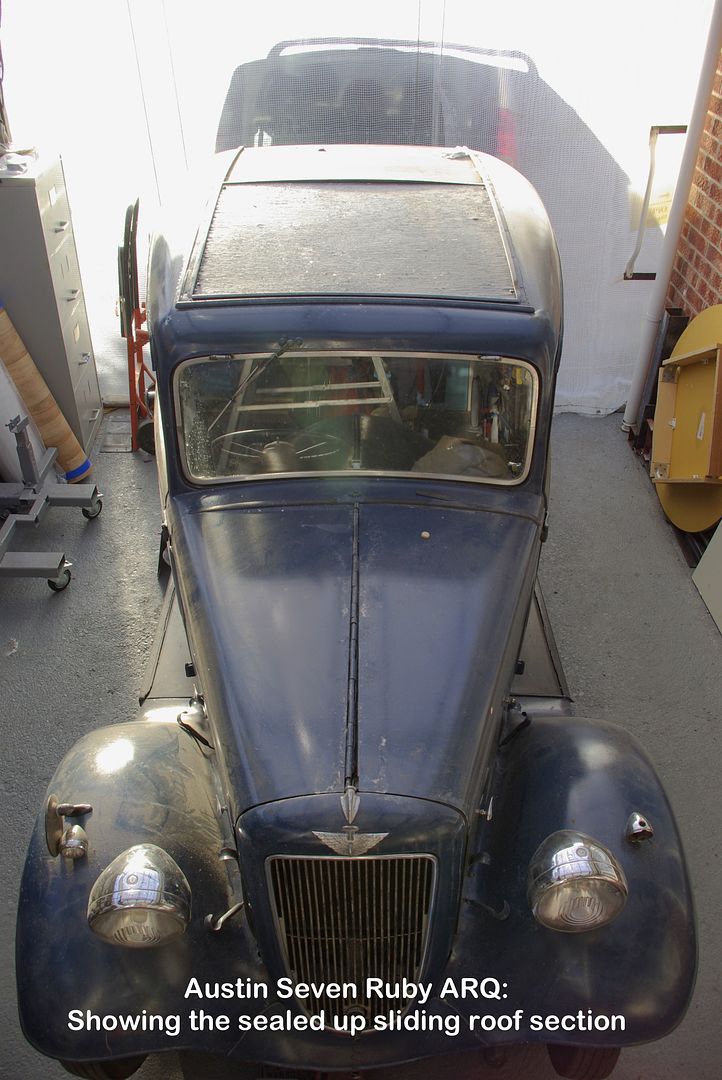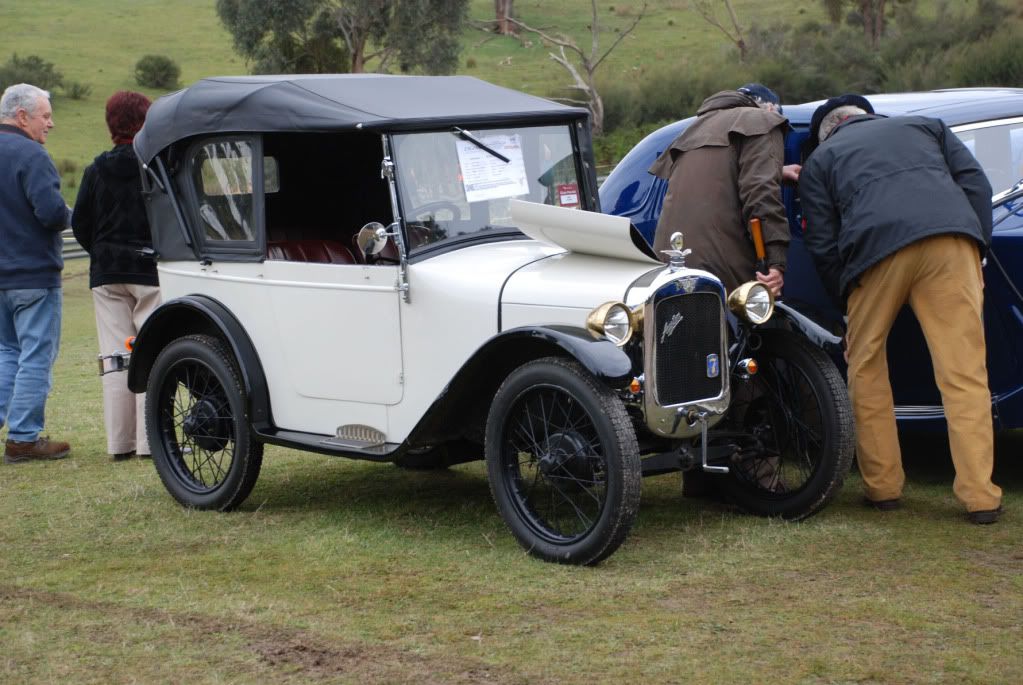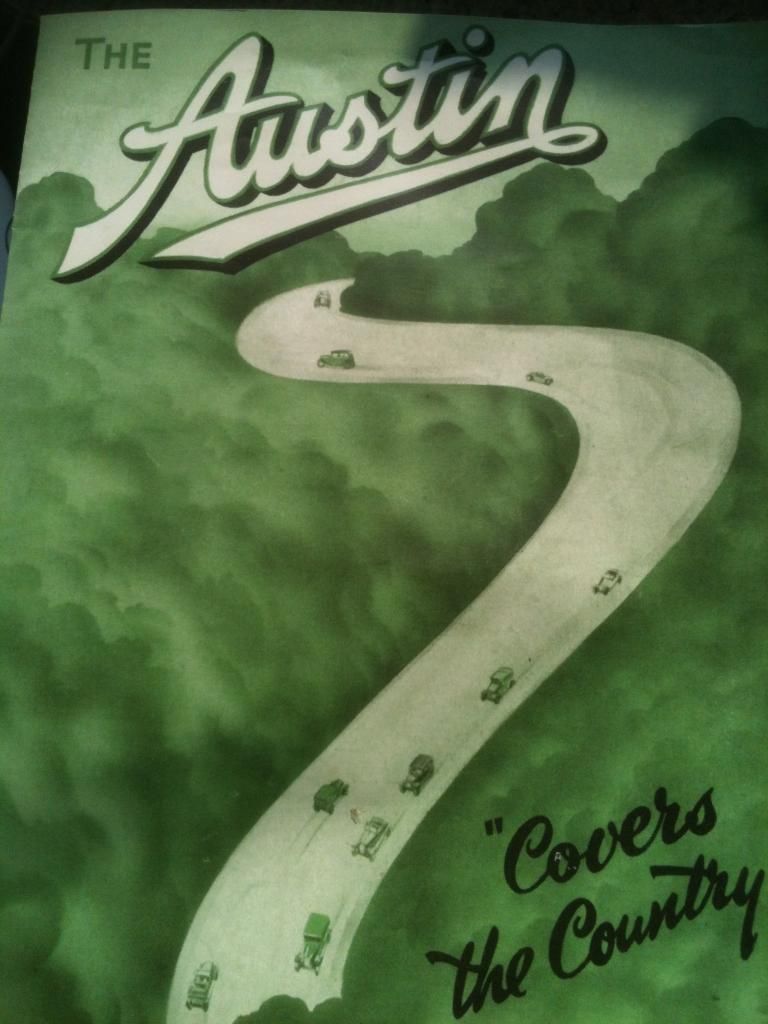
Welcome to the Austin Seven Friends web site and forum
As announced earlier, this forum with it's respective web address will go offline within the next days!
Please follow the link to our new forum
http://www.austinsevenfriends.co.uk/forum
and make sure, you readjust your link button to the new address!
Why aren't we all driving Austin Eights? After all, the engine size was very quickly uprated to 747cc and 7.8 HP. This is much closer to 8 than 7, and there was no Trades Descriptions Act then. Even today car data is 'rounded up' so that a 1998cc engine is called '2 litre'. I think we should be told.
Location: Ministry of Silly Questions, Shropshire
The usual corporate inertia, or more likely nobody willing to take the plunge and suggest the change and then either being heaved in the direction of Coventry, or bull manured on from a dizzy height by management in general.
Corporates are worse than Supertankers for changing direction or minds, and the management at the time where dead against building such a small car, so I very much doubt if Herbert or Stanley where going to broach the subject and cause themselves more grief.
They had the company's survival in their hands. (Is that ' correct?)
Geoff - Just my thoughts. Apostrophe nightmare on occasion 
Location: South Norfolk - Next to Suffolk
Of course - how silly of me!
Location: Ministry of Silly Questions, Shropshire
Silly me as well 

The obvious doesn't always hit me in the mush.
Geoff - I do have the perfect excuse though.
Location: South Norfolk - Next to Suffolk
I believe that one of the contemporary magazines described it as "a fiscal misnomer".
Location: Herefordshire
Actually, thinking about it, if the car is rated at 7.8 HP then surely it would still rank for the lower rate even if you called it an 8.
Location: Ministry of Silly Questions, Shropshire
Surely someone in the UK knows how the tax rules were applied. I only know that it was one pound p.a. per RAC hp for much of the Sevens life, and later 15s, a helluva lot in real terms.
Someone must know whether RAC hp was rounded up or down. My understanding is that the Austin Seven was taxed at 8 hp for at least part of the period.
A hunt through old road tests may reveal the tax payable.
Bob Culver
Location: Auckland
Whilst makers and individuals were free to round up or down,it appears that for tax RAC hp was rounded up. I found road tests without a lengthy hunt. Tax is quoted as L8 and later L6. I suppose the situation was commonly known at the time. If I had purchased a 1935 Ruby instead of a Morris 8 or even a Ford 8Y I would have been p----- off to quote SCH Davis, without finding I had been conned for tax as well!
(We are all owners of second hand Sevens, the situation is quite different from that of new purchasers!)
Bob Culver
Location: Auckland
It is simply that there is something magical about the number 'seven'. The world and his wife remembers the Austin seven. Who remembers the Austin eight? and didn't Sterling Moss have a 7 on all his racing cars?
Perhaps the Austin Seven should have been an eight but if it was cheaper road tax then there was at least some logic to it. However, the 'Seven' carried on as a marketing tool for donkey's years. Not content with badging the A30 as a 'Seven' the name was even given to the mini! I could understand the 'mini minor' but calling the Austin mini the 'Austin Seven' was really taking badge engineering a bit far!
I suppose it's all good fun though and that's fine by me. 
Location: Derby
The car was introduced correctly as a Seven with much publicity and the name implied small size. Some of the early favourable publicity may have been more tempered if the car had been an 8.To immediately change to 8 with no apparent alteration would have been confusing and many may have seen the car as frail for an 8.
The road tests do spell out the tax; I wonder if this was so common with less deceptive models.
The RAC formula ignores stroke so for the same capacity multi cyl engines with associated shorter stroke and consequently larger bores are penalised. Very early Jowetts were advertised as 7s when actually 6s because the latter was considered to sound too puny. Several Austin 6 cyl models of the mid 30s were blatantly titled with hp less than the RAC. I guess nowadays some consumer authority would protest.
Bob Culver
Location: Auckland
All the road tests for the Austin Seven after 1923 show the RAC rating as 7.8 HP - no cover up there!!
Later tests show RAC cost at £8 - which was reduced to £6 around December 1934, again no false advertising.
The name Austin Seven was given to the car at launch when it was 696cc and RAC rated at RAC 7.2 HP. By the time it was upped to 747 and 7.8 HP in 1923 the name Austin Seven (always spelled out- not Austin 7) was obviously becoming well known and accepted so why change.
Many other cars used numbers- Singer 9, Morris 8, but Austin Seven in the well known script was an excellent 'trade mark' never to be lost!!
Tony.
Location: Malvern, Melbourne.
Poetic licence? 
Although not that poetic is it ? 
Don't remember that bit of advertising 
Tony.
Location: Malvern, Melbourne.
I believe that tax was charged on the basis of "per horsepower or part thereof".
The treasury rating was a nonsense, based on a theoretical calculation that took no account of stroke - hence the tendency for British enginges to have a much longer stroke in relation to the bore as compared to, say, American engines.
Some manufacturers took advantage of the Treasury's under-rating by giving their models descriptions like "Wolseley 16/60", showing the horsepower that you paid for against what was actually delivered. "Austin 8/13" might not have appealed to the marketing department!
Location: Herefordshire, with an "E" not a "T".
You can buy a reproduction copy here Tony: http://www.a7c.co.uk/spares.php#nogo
Scroll to "Bookshop", then "Brochures & Posters" it is part number BT833.
Hi Martin
The RAC rating was not entirely nonsense. Rev for rev engines of same state of development give power proportional to revs. But larger engines rev less, vaguely related to the the ratio of strokes. So by omitting the stroke factor the formula applied reasonably across all capacities. At the time of introduction the hp typically approximated the bhp for many cars. The early model T and Silver Ghost both developed about their RAC hp (23, 48 bhp.)
The formula fails on seriously non typical engines; ultra long stroke, few cyls, and vice versa. And after WW1 became increasingly inaccurate as an indicator of bhp, although still a general relative indicator. A pre WW1 Peugoet freak racer with 11 inch stroke twin was 2.8 litres and 8 RAC hp! The 1960s 1 litre Anglia was 16 RAC hp! The 7 RAC Jowett twin was of considerably larger cc than the 8 RAC Austin "Seven"
Bob Culver
Location: Auckland
With respect, Bob, I'd suggest that you've proved my point! The RAC rating for most of its life WAS nonsense. It only applied with any degree of accuracy to "standard" engines at a particular point in history. After its introduction, most British engines were specifically designed to avoid the resulting tax.
I guess that the RAC rating's last gasp was in the early 'seventies, when the oil crisis became so serious in the UK that petrol ration books were actually issued, though never used. I remember being deeply dissillusioned that my father's 3500cc executive saloon was only credited with 20hp!
Location: Herefordshire, with an "E" not a "T".
According to this article (I know, you can't believe everyting on the web) The RAC rating was generally correct up to the mid 30's
http://www.designchambers.com/wolfhound/wolfhoundRACHP.htm
Sound reasonable!
Tony.
Location: Malvern, Melbourne.
Afraid not Tony.
The dauntingly mathematical article is effectively summarised in my posts.
The article states that in mid 30s bhp was often 3 to 4 times the RAC hp.
(In 1930 a typical 10 was 30 bhp)
Nevertheless the RAC rating was for tax purposes a reasonable relative measure.
Many claim that it discouraged and thus postponed large bore and thus higher rpm engines, but low octane fuel and white metal big ends were also major limiting factors prior WW2. Large bores limit cr, and produce high combustion loadings on the bearings. And anyone who has driven a Fordson van will appreciate that engines which rev even more than a Seven are far from desirable!
Apart from the short stroke Model T and the Chev 4 inspired by it, early American engines used relatively long strokes as English engines.
bob Culver
Location: Auckland
Bob,
Perhaps I should have said 'reasonably correct as a comparison tool for taxation purposes when introduced' - the BHP is another measure altogether and for whatever reason the RAC rating was decided on as giving a rating basis.
The calculation given in the reference indicates the RAC rating doesn't ingnore all the design aspects - a complaint often leveled at the simple rating formula.
Tony.
Location: Malvern, Melbourne.




